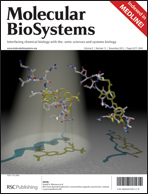Metabolomic identification of diagnostic plasma biomarkers in humans with chronic heart failure
Abstract
Chronic heart failure (CHF), as a progressive clinical syndrome, is characterized by failure of enough blood supply from the heart to meet the body's metabolic demands, and there is intense interest in identifying novel biomarkers that could make contributions to the diagnosis of CHF. Metabolomics, compared with current diagnostic approaches, could investigate many metabolic perturbations within biological systems. The overarching goal of the work discussed here is to apply a high-throughput approach to identify metabolic signatures and plasma diagnostic biomarkers underlying CHF by 1H-NMR spectroscopy. Plasma samples from 39 patients with CHF and 15 controls were analyzed by NMR spectroscopy. After processing the data, orthogonal partial least square discriminant analysis (OPLS-DA) was performed. The statistical model revealed good explained variance and predictability, and the diagnostic performance assessed by leave-one-out analysis exhibited 92.31% sensitivity and 86.67% specificity. The OPLS-DA score plots of spectra revealed good separation between case and control on the level of metabolites, and multiple biochemical changes indicated hyperlipidemia, alteration of energy metabolism and other potential biological mechanisms underlying CHF. It was concluded that the NMR-based metabolomics approach demonstrated good performance to identify diagnostic plasma markers and provided new insights into metabolic process related to CHF.


 Please wait while we load your content...
Please wait while we load your content...